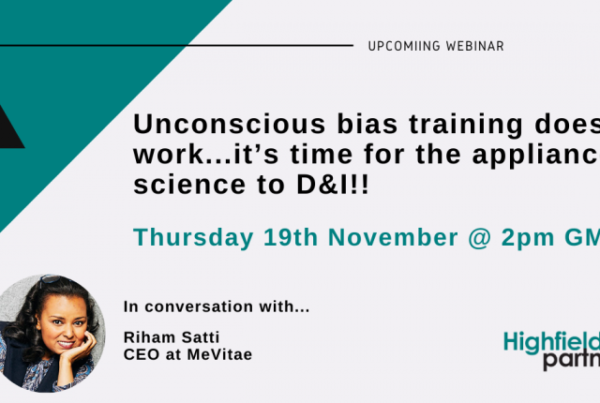The problem of ‘commercial thinking’ has been mooted for so long in the HR profession, I would not be surprised to see it referenced in the Magna Carta!
Recent research by The Highfield Partnership showed that 3 out of 4 HR leaders considered commercial thinking as the No.1 missing item when meeting candidates for mid-level generalist appointments, with 2 out of 3 indicating it was the most important quality they look for. With nearly 20 years of meeting HR professionals though, I would say the vast majority would state commercial thinking as one of their listed strengths. So why does there seem to be this disconnect, and why does the profession not seem to have made greater strides to resolve this recurring theme?
Are perceptions mis-aligned or simply misguided? Are assessment methods failing to draw out capability as well as they should? Do HR professionals know what ‘good’ looks like in the first place and how to support their teams to achieve this? Is this really as big an issue as claimed if little has been done to change it?
So as follow up research, we wanted to probe more deeply into this subject, to find out how people are being assessed, what HR leaders are looking for to ascertain commercial thinking capability, and what has been working to bring success in driving up commercial competence levels in their HR teams.
Here are some of the headlines from our findings:
- 30% HR leaders stated commercial thinking was the top priority when hiring at HR BP/Management level, almost all felt it was at least a key priority
- 2 out 5 HR leaders rely purely on an interview to assess commercial thinking
- In 80% of cases, the majority of recent mid-level HR hires do not have experience outside of an HR department, and 40% of HR leaders reported that not one of their last 5 hires had experience outside of HR
- To help support their HR teams develop commercial skills, 70% offered technical training (such as financial understanding), 46% promoted further non-HR academic studies and 44% encouraged work shadowing. 14% offer no constructive support at all
- 20% of HR leaders who responded said they undertook no form of evaluation when appointed to their current HR leadership role
- Appointments at mid-level undergo a wider range of assessment methodology to assess their capabilities than leadership level appointments – 54% HR leaders only experienced an interview compared to 39% mid-level
IS THERE A PROBLEM AT THE TOP?
Don’t shoot the messenger!!!
This is in fact an opinion that has been expressed to me by highly experienced HR Directors on a number of occasions. Are some HR leaders themselves really as equipped as they could be to recognise and therefore assess for true commercial aptitude. What is striking is the statistic that 1 in 5 HR Directors questioned effectively walked into their roles without any form of assessment. Equally note-worthy is the fact that organisations seem to use a wider range of assessment tools to verify commercial competence at managerial or BP level, than at leadership level. This begs the question of whether organisations may be guilty of applying less scrutiny to the HR hires which will in fact have the greatest commercial influence. The questioning is no doubt more detailed around commercial thinking, and probably from commercial stakeholders, but nonetheless it is surprising to see wider assessment tools are more rarely used to offer additional insight into capability, not to mention contextual fit. It has also been mooted on occasion to question whether some business leaders want a ‘truly’ commercial HR Director, perhaps concerned they may prove a little too ‘disruptive’ for their appetites!
CULTIVATING THE SKILLS
An encouraging statistic was 85% of the HR leaders to respond are taking some steps to help cultivate these skills in their teams. Formal training in areas such as financial understanding was most widely deployed, with shadowing and mentoring being used by nearly half. Perhaps a challenge is to give HR professional the opportunity to second into other commercial functions. This is still a debate at leadership level, with a lack of HRD’s moving to CEO roles, and it seems some HR leaders indeed favour taking on people who’ve already worked outside of HR. The survey suggests 22% of organisations organise secondments, which seemed a little higher than I would anecdotally have anticipated – it is still rare I see secondments to non-HR roles on people’s profiles at mid-senior level, even though I suspect progress is being made in this area.
We have also started a survey of mid/snr management level HR generalists to see if their perspective tallies with that of their HR leaders on the support they think they get in this area….so keep an eye out for that!
ARE THE TOOLS FIT FOR PURPOSE
Is it possible HR competence levels have improved, but the means to assess them accurately aren’t being deployed? As a consequence do some people miss out because they haven’t worked in the same industry, or their interview technique isn’t honed well enough? I am not claiming to be an expert, and do place a lot of stock on good, detailed questioning to get a genuine feel for someone’s commercial sense…but, I am a little surprised at sparse use of more quantifiable assessment tools when looking to gauge commercial thinking. For example, Craig Pattison (formerly EVP Global HR at consulting firm Wood Mackenzie) said of all the tools to assess commercial competence, behavioural profiling were arguably least effective – relying normally on the follow up competency questions to really give the meaningful insight. Practical exercises to simulate these skills (such as situational judgement exercises, case studies, presentations) could in fact offer more insight, a point also raised by Ben Williams, MD of Assessment Design Consultancy Sten10. These tools were reportedly used by less than a third of respondents, and it’s worth noting less than 10% of the HR leaders undertook any of these when appointed to their roles. Interviews alone remain the favoured option for assessment, and this does open the door for the spectre of unconscious bias to hinder diverse hiring, not to mention reliance on the capability of the interviewer to assess this in the first place.
HELP!
I don’t have a silver bullet, this article is merely intended to provoke some introspection and where warranted prompt some affirmative action. However within the survey I also asked HR leaders what tools they find helpful, what lines of questioning they use to good effect, and what innovative steps they took to address this issue. This is too much to include on this article, but you can access these on my company website by following the link here https://www.highfieldpartners.com/practical-tips-from-hr-leaders-to-help-assess-for-commercial-thinking/
If you have any comments, questions, or would like a copy of the survey report, please contact me on tom.godber@highfieldpartners.com




